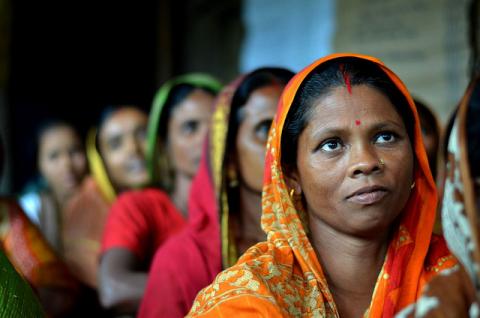Select the newsletter(s) to which you want to subscribe or unsubscribe.



The consideration of sex and gender are not the most obvious issues that come to mind when discussing epidemics and pandemics. However, sex and gender have an important impact on these issues, since barriers to pandemic preparedness and risk behaviour can often be better understood when viewed from a sex and gender perspective.
Both gender and sex have an impact on experiences and behaviours relating to pandemics, epidemics and vaccination. The difference between sex and gender can be confusing, and the two words are often incorrectly used interchangeably.
Sex refers to the organs you are born with, and the chromosome makeup that determines whether you are male of female. This is a biological fact, defined by XY or XX chromosomes.
The WHO describes gender as the socially constructed characteristics of women and men – such as norms, roles and relationships of and between groups of women and men. Gender thus refers to the norms that come with being of a particular sex, where for example those of the female gender are expected to have certain characteristics, behaviours, and roles.
The chief deliverable of ASSET Task 7.9 is to create a Gender Platform informing about these issues. The Gender Issue Platform will be an area of the ASSET website dedicated to disseminating and promoting gender-specific and women-centred research on pandemics.
In particular, it aims to disseminate information on influenza pandemic related risks, notably for pregnant women and infants; preventive measures; antiviral drugs; vaccines and vaccination; and make information available to women, in order to enable them to make informed and responsible decisions for themselves, and also as carers of children and ageing relatives.
Central to the task as well is the issue of promoting gender awareness in pandemic related research and pandemic preparedness. The Gender Issue Platform will also advocate for increasing European support for preventive and appropriate biomedical, behavioural, epidemiological, public health and health service research. It will also promote policy on women's issues in pandemics, and the impact of gender and age inequalities with respect to infectious outbreaks.
Below is a short summary of issues where gender and sex affect pandemics, epidemics and vaccination:
Sex differences in influenza and vaccination
Biologically, females and males differ in their immunological responses to seasonal influenza virus vaccines. Women have higher antibody responses to influenza vaccinations – the antibody response of a woman to half a dose of influenza vaccine is equivalent to the antibody response of a man to the full dose.
Pregnancy
Pregnant women are especially at risk during a pandemic/epidemic, due to unique factors connected to pregnancy.
Health care workers and Carers
These groups tends to be predominantly female, and there is little consensus or evidence-based data on how to target behaviours and the low vaccination rates of HCW, and how to reach out to carers.
Hard to reach groups
Hard to reach groups may have adverse health outcomes, and the complex interplay of gender and social and economic marginalisation makes this a particular issue for women.
Older women
Older women’s vaccination behaviour is not fully understood. Also, women in general, and older women in particular, are underrepresented in clinical trials and research, thereby hindering any development of sex-specific treatments or policy guidelines.
Distrust of vaccinations
Considering demographic, ethnic and social differences, including gender, allows for a more effective and targeted communication against distrust of vaccination.
The Gender Issue Platform will play a role as a concrete infrastructure by raising awareness of the above issues and more. It will be hosted in a dedicated area within the ASSET website, with a permanent link on the homepage. The Gender Area will include four different sections with different contents:
Links
[1] http://www.asset-scienceinsociety.eu/target/citizens
[2] http://www.asset-scienceinsociety.eu/target/decision-makers
[3] http://www.asset-scienceinsociety.eu/target/government-and-public-health
[4] http://www.asset-scienceinsociety.eu/target/healthcare-professionals
[5] http://www.asset-scienceinsociety.eu/target/school-and-education
[6] http://www.asset-scienceinsociety.eu/topic/citizens-mobilization
[7] http://www.asset-scienceinsociety.eu/topic/gender
[8] http://www.asset-scienceinsociety.eu/topic/human-rights
[9] http://www.asset-scienceinsociety.eu/topic/policy
[10] http://www.asset-scienceinsociety.eu/topic/stakeholders
[11] http://www.asset-scienceinsociety.eu/topic/vaccination
[12] http://www.asset-scienceinsociety.eu/tags/gender-issues
[13] http://www.asset-scienceinsociety.eu/tags/preparedness
[14] http://www.asset-scienceinsociety.eu/tags/awareness
[15] http://www.asset-scienceinsociety.eu/tags/risk-perception